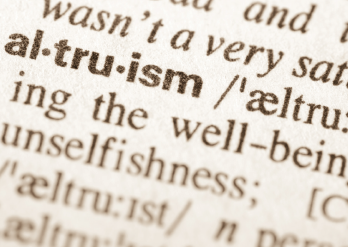Clinical Scenario
You are seeing an established patient today, a 78-year-old female with a recurring history of imbalance and dizziness. She is a favorite patient of yours, with a keen mind and happy disposition. Your differential diagnoses in the past have centered on cardiovascular etiologies, and you are working with her new personal physician to provide regular evaluation and recommendations for balance improvement. The patient’s husband typically has accompanied her to the semi-annual office visits. As you enter the room, you note that the patient is alone, with an unusually downcast demeanor. As you and the visiting medical student greet the patient, you immediately sense that all is not well with her. You sit next to her, grasp her hand, and inquire what is wrong. She tells you that her husband of 55 years passed away last month, and she is completely lost. Her personal physician, a young man not long out of residency, has prescribed anti-anxiety medications to her, but owing to his busy practice, has not had time to listen to her and support her despondency. She claims he is always on his computer during her visits and doesn’t seem to be interested in listening, unlike her previous physician, who cared for her for decades before she retired from medical practice.
Explore This Issue
August 2019The patient begins crying, and you realize this could be a pivotal point in the patient–physician relationship, as well as a teaching moment for the physician-to-be in the room. You also have a very busy schedule today, so you have to decide how to address the patient’s needs at this very moment.
How would you handle this case?
Discussion
The medical profession has long held a contract with society to care for the physical, mental, and emotional needs of the individual patient. It has previously been clear that a physician was not merely a scientist or technician who utilized knowledge of medicines, surgery, and other therapies in a totally disengaged manner, but rather a healer who was devoted to the care of the entire person, and to whom the patient-physician relationship had significant meaning.
There has been a social expectation that physicians would possess and exhibit the special qualities (virtues) of altruism, empathy, and compassion, and the presence of these qualities in applicants to medical school and residency programs has been a part of the evaluation process. However, an expectation of the ideal qualities in a physician and the reality of their presence can be quite different. No physician has “perfect” virtue, and the illegal, immoral, and unprofessional activities of a small number of physicians over the years has diminished the profession’s reputation in society. Additionally, time constraints, electronic health records, governmental regulations, and so many other onerous external and internal forces may have strained a physician’s ability to practice beyond the necessary science and mechanics of addressing disease processes.
This scenario raises the concern whether altruism, empathy, and compassion are still valued virtues in “modern” medicine, or whether patients have come to expect something else in the provision of their healthcare by physicians.
To evaluate this question, one must first address whether these virtues, previously held to be important qualities in a physician, are inherent, learned, or both. Being an “ethical” physician most likely requires a sense of dedication to the patient, devotion to providing the best possible healthcare and conducting oneself, as a physician, in a manner that reflects positively on the profession by adhering to the principles of autonomy, beneficence, non-maleficence, and social justice. This author has decided that, by the time an individual matriculates at medical school, he or she will not have matured into a fully ethical person, but that this capability is one of life-long improvement and learning. This is a positive viewpoint that the overwhelming majority of physicians want to be ethical and strive to conduct themselves in an ethical fashion. The question then becomes whether these virtues of altruism, empathy, and compassion are still germane to the practice of medicine in these evolving and challenging times.
A corollary to the above question might be: “Why do young women and men want to be physicians?” Is it because they are interested and competent in biology, mathematics, bioengineering, social psychology, or applied analytics, or are they attracted to a profession that is over-
archingly dedicated to the higher ideals of the comprehensive care of persons in need? Perhaps it is not a binary choice, but rather a spectrum of reasons lying between pure science and pure altruism. Do patients still value the textbook traits and virtues of physicians, or would they prefer a clear-thinking scientist or one technically expert over one with a kind and compassionate bedside manner? Has the expectation for a Dr. Marcus Welby given way to a desire for a Dr. Gregory House? Is rationality valued over empathy? Can a modern-day physician/surgeon possess both?
